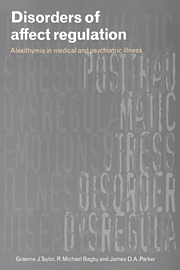Book contents
- Frontmatter
- Contents
- Foreword
- Acknowledgments
- Acknowledgment of permission for use of material
- Introduction
- 1 The development and regulation of affects
- 2 Affect dysregulation and alexithymia
- 3 Measurement and validation of the alexithymia construct
- 4 Relations between alexithymia, personality, and affects
- 5 The neurobiology of emotion, affect regulation, and alexithymia
- 6 Somatoform disorders
- 7 Anxiety and depressive disorders and a note on personality disorders
- 8 Substance use disorders
- 9 Eating disorders
- 10 Affects and alexithymia in medical illness and disease
- 11 Treatment considerations
- 12 Future directions
- Appendix
- References
- Index
10 - Affects and alexithymia in medical illness and disease
Published online by Cambridge University Press: 21 September 2009
- Frontmatter
- Contents
- Foreword
- Acknowledgments
- Acknowledgment of permission for use of material
- Introduction
- 1 The development and regulation of affects
- 2 Affect dysregulation and alexithymia
- 3 Measurement and validation of the alexithymia construct
- 4 Relations between alexithymia, personality, and affects
- 5 The neurobiology of emotion, affect regulation, and alexithymia
- 6 Somatoform disorders
- 7 Anxiety and depressive disorders and a note on personality disorders
- 8 Substance use disorders
- 9 Eating disorders
- 10 Affects and alexithymia in medical illness and disease
- 11 Treatment considerations
- 12 Future directions
- Appendix
- References
- Index
Summary
In the Introduction to this book, we briefly outlined different periods in the history of medicine when prominent physicians and philosophers firmly held the belief that people's health can be influenced by their emotions. During the 19th century, many physicians attempted to evaluate this belief scientifically by investigating the direct effects of various emotions on different bodily functions. Beaumont (1833), for example, demonstrated that fear and anger reduce secretion from the gastric mucosa. The emergence of psychoanalysis at the beginning of the twentieth century led to a very different approach, as it inspired several psychoanalysts to begin to study the personality traits and psychological conflicts that were assumed to be responsible for the emotional states contributing to the development of disease. It was largely the enthusiasm and work of these psychoanalysts that led to the emergence of psychosomatic medicine as an organized movement and to the founding of the American Psychosomatic Society in the early 1940s.
During the past 50 years, however, psychosomatic theorists have proposed several different models for understanding the development of somatic disease that involve different conceptualizations for the role of affects. In this chapter, we first briefly review the different theoretical models, and then present a contemporary model in which deficient emotional processing is viewed as one of several possible factors that can dysregulate other biological systems in the body and thereby create conditions favourable for the emergence of medical illness or disease.
- Type
- Chapter
- Information
- Disorders of Affect RegulationAlexithymia in Medical and Psychiatric Illness, pp. 216 - 247Publisher: Cambridge University PressPrint publication year: 1997
- 7
- Cited by



